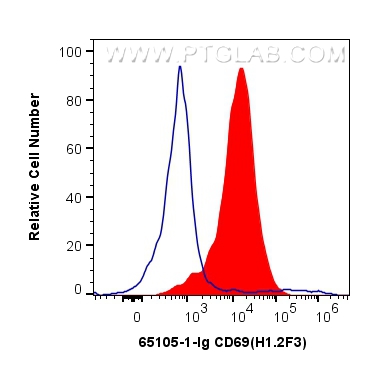验证数据展示
经过测试的应用
| Positive FC detected in | Anti-CD3/CD28-stimulated mouse splenocytes |
推荐稀释比
| 应用 | 推荐稀释比 |
|---|---|
| Flow Cytometry (FC) | FC : 0.5 ug per 10^6 cells in 100 μl suspension |
| This reagent has been tested for flow cytometric analysis. It is recommended that this reagent should be titrated in each testing system to obtain optimal results. | |
| Sample-dependent, Check data in validation data gallery. | |
产品信息
65105-1-Ig targets CD69 in FC applications and shows reactivity with mouse samples.
| 经测试应用 | FC Application Description |
| 经测试反应性 | mouse |
| 免疫原 |
Mouse dendritic epidermal T cell line Y245 种属同源性预测 |
| 宿主/亚型 | Armenian Hamster / IgG |
| 抗体类别 | Monoclonal |
| 产品类型 | Antibody |
| 全称 | CD69 antigen |
| 别名 | AIM, CD69 antigen, H1.2F3, VEA |
| GenBank蛋白编号 | BC106997 |
| 基因名称 | Cd69 |
| Gene ID (NCBI) | 12515 |
| RRID | AB_2918404 |
| 偶联类型 | Unconjugated |
| 形式 | Liquid |
| 纯化方式 | Affinity purification |
| UNIPROT ID | P37217 |
| 储存缓冲液 | PBS with 0.09% sodium azide, pH 7.3. |
| 储存条件 | Store at 2-8°C. Stable for one year after shipment. |
背景介绍
CD69, also known as AIM, EA-1, Leu-23, and MLR3, is a type II transmembrane glycoprotein that belongs to the C-type lectin superfamily (PMID: 8340758; 7804122). CD69 is constitutively expressed by mature thymocytes, platelets, several subsets of tissue resident immune cells (including resident memory T cells and gamma delta T cells), and is inducibly expressed by activated T cells, B cells, natural killer (NK) cells, monocytes, neutrophils (PMID: 8100776; 28475283). CD69 has been identified as an early activation marker of lymphocytes and is commonly used as a marker of activated lymphocytes and NK cells (PMID: 28475283; 25759842). It is involved in the regulation of immune responses (PMID: 15745855).
实验方案
| Product Specific Protocols | |
|---|---|
| FC protocol for CD69 antibody 65105-1-Ig | Download protocol |
| Standard Protocols | |
|---|---|
| Click here to view our Standard Protocols |


